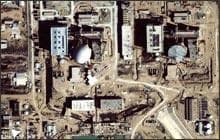Advertisement
Nuclear Iran
Resume By guest host John Hockenberry:
By guest host John Hockenberry:The oil-exporting Shiite Islamic nation of Iran has skillfully emerged as a regional power broker since the U.S. invasion of Iraq with new influence from Afghanistan to Lebanon. Now it is signaling that it is willing to flex its muscle to the world community by acquiring a nuclear capability.
Can Iran be stopped and should it be? Is there a way to coexist with a nuclear Iran and contain an Iranian superpower? Can the global community deal with a leader who openly threatens Israel and has denied the Holocaust? Is it imperative to open a real dialogue with the world's newest emerging military power regardless of the rhetoric?
Hear about rogues, realists and the Iranian nuclear bomb.
-- Quotes from the Show ---
"The US approach to Iran and for that matter North Korea has been more reactive than proactive." Michael Hirsh
"The nuclear program in Iran is driven primarily by national pride and internal politics [and] less by security threats." — Jim Walsh
"I don't see [the potential for Iran developing a Hezbollah nuclear capability] as an imminent threat. ...The relationship between the Tehran regime and Hezbollah is strategic, that is the activities of Hezbollah in Southern Lebanon are viewed as an extension of the Iranian Revolution." Robert Litwak
"Iran poses a special risk because it is an extremist regime ... and could use the nuclear leverage in a whole variety of ways." David Rothkopf
Guests:
Michael Hirsh, senior editor, Newsweek
Jim Walsh, Research Associate, MIT's Security Studies Program. Last month, he testified before the U.S. Senate on "Iran and the Nuclear Issue: Negotiated Settlement or Escalation?"
Robert Litwak, Director of International Security Studies, Woodrow Wilson Center. He was director for nonproliferation at the National Security Council in the first Clinton administration (1995 to 1996). He is the author of "Rogue States and U.S. Foreign Policy: Containment after the Cold War. His forthcoming book is "Regime Change: U.S. Strategy Through the Prism of 9/11".
David Rothkopf, Visiting Scholar, Carnegie Endowment for International Peace. He is the author of "Running the World: The Inside Story of the National Security Council and the Architects of American Power".
This program aired on August 24, 2006.